A few episodes into the first season of BoJack Horseman, I must confess that I wasn’t exactly loving it. Any regular TV viewer will know that many shows tend to have rocky pilots or take a little while to find their footing, but aside from a few clever animal puns and the occasional inside-baseball Hollywood satire, it felt a little too light and silly to really make use of its admittedly intriguing concept (that of a washed-up former sitcom star struggling to find relevancy in the modern world). The central character initially came across as too boozy and self-absorbed to truly care about himself or others, which I felt would either result in some trite lesson-learning and unearned character growth, or just a series of comic mishaps where these qualities would simply serve to make him “likable” and insulate him from any real consequences his shitty behavior might engender.
As I stood on this precipice, where I had to decide whether to commit to the rest of the season or call it a day, I found out that many of my friends and colleagues faced a similar dilemma. There are several I know who never kept up with the show after those initial episodes because they were so put off. But the ones who finished it implored me to keep going, insisting that things get infinitely better. They couldn’t elaborate on how exactly, except that it got “really real.” So, on their advice, I made it through to the end of the season, and subsequently through to the end of BoJack Horseman (Netflix released the final episodes on January 31st). And I couldn’t be gladder that I did, because the people in that second group were absolutely right. This show is really real.
More Man Than A Horse
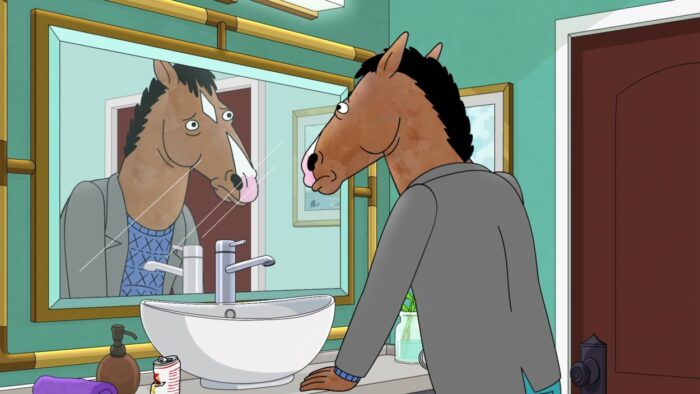
BoJack Horseman initially disarms you with its anthropomorphic animal hijinks and depictions of drug-addled celebrities indulging in bad behavior and constantly getting away with it. But lurking under the surface is something much darker, more uncomfortable, and in its own roundabout way, more unflinchingly truthful.
By the end of Season 1, BoJack has confronted the dying man he screwed over years ago, realized the only saleable version of his memoir is one that highlights how normal and broken he is, and suffers an honest-to-god emotional breakdown after an elaborate acid trip where he finds himself pleading to his memoirist to tell him that he’s a good person in front of a live audience. It’s heart-breaking and truly painful to watch, played with complete sincerity and emotional nakedness. As she fails to respond, the ensuing silence stretches on for what feels like an eternity. That is, until one audience member breaks the tension with his own question, one that BoJack has simultaneously allowed to define him and been trying to escape from ever since the ‘90s: “Hey, aren’t you the horse from Horsin’ Around?”
With its cards fully on the table, Raphael Bob-Waksberg’s show was now able to pursue its true interests, using this warped depiction of Hollywood (later referred to as Hollywoo with impressive consistency after BoJack steals the D from the famous sign in one of his many benders) as a means to explore the deeply troubled individuals that populate it, whose out-sized personalities mask an all-too-recognizable inner turmoil. Over the course of six seasons, BoJack Horseman delved deeper and deeper into the psyche of its engaging cast of characters, seeing what makes them tick and how their interpersonal relationships with each other and the outside world both inform who they are and clash against it.
Filling The Void
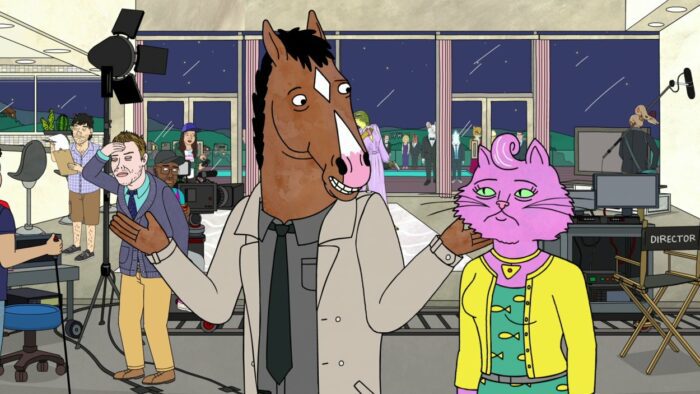
Front and center is BoJack himself. Known almost exclusively as the star of a Full House-esque sitcom that enjoyed massive popularity while being regularly referred to as “not Ibsen,” the titular horse-man has been able to more or less coast on that success for decades, enjoying a massive mountainside home that overlooks all of Los Angeles and enough leftover residuals to spontaneously buy a restaurant that he proceeds to show almost no interest in actually running.
Yet he enjoys none of it, wallowing in self-pity and yearning for some kind of personal connection or at least validation that he isn’t a total waste of space, despite regularly dismissing those who support him and sabotaging his own attempts at happiness every chance he gets. We learn that he comes from a particularly unsupportive home, with parents who barely pretend not to hate him almost as much as they hate each other (and by extension, themselves). As his mother Beatrice informs him after reading his book, he comes by his unhappiness honestly.
Yet for all his self-loathing and cynicism, opportunities do find their way to his doorstep. The success of the book grants him the opportunity to play his dream role, Secretariat, which he initially throws himself into before growing increasingly disillusioned and ultimately bailing on the project. This doesn’t stop the film from becoming a massive success and him being swept into an extensive Oscar campaign, despite his entire performance ultimately being recreated digitally. Even when he fails to land the nomination, further career mobility presents itself in the form of a streaming series about a detective on the edge that feels uncomfortably close to BoJack’s own life experience. He pursues each of these projects with veracity, then reluctance, then ultimately dismissal, before eventually spiraling out and either leaving town to find himself or sucking others into his destructive vortex (often both).
Hitting Close To Home
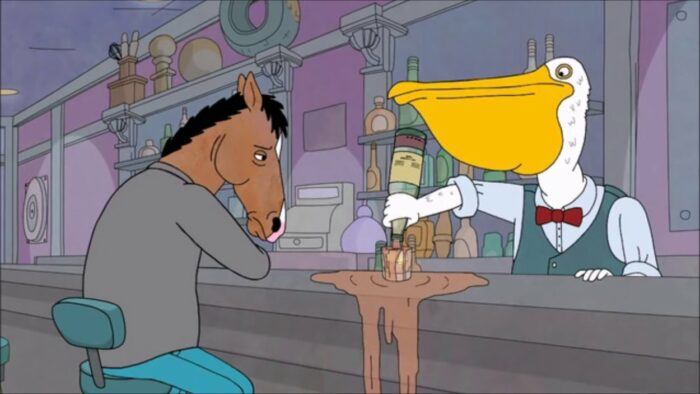
Rarely has TV (especially animation) presented such an unflinching depiction of the cycles of depression. Fans have diagnosed BoJack with Borderline Personality Disorder (as defined by emotional instability, feelings of worthlessness, and impaired social relationships), which certainly seems to fit the bill. Regardless of what label you want to put on it, BoJack’s behavior is painful to watch because despite his fame and wealth (and the fact that he’s, you know, a horse) he acts in ways that feel completely human. He’s petty, impulsive, occasionally kind-hearted, accidentally profound, and ultimately just trying to fill the void inside of him, to justify his own existence, to be loved on his own terms.
Over the course of the series, he does some truly terrible, borderline unforgivable things. He sabotages a friend’s passion project to stop him from moving out. He travels to New Mexico to reconnect with an old friend, and upon realizing that she’s now happily married and raising a family, comes dangerously close to sleeping with her teenage daughter. He exposes his own potential daughter to accidental drug abuse via his now-senile mother. In a particularly intense psychotic break triggered by pain medication, he almost strangles one of his co-stars while filming his detective show, unable to separate his despicable character from his despicable self.
BoJack Horseman makes it increasingly difficult to like its protagonist, and yet gives you just enough of a glimmer of hope that you don’t quite hate him either. He is his own worst enemy, and in spite of his many failings he tries desperately to believe that he can still be a good person underneath. This is a fallacy, as his memoirist Diane Nguyen patiently explains on several occasions. People aren’t inherently good or bad, merely the sum of the actions that they take day to day. We aren’t here to pass judgement on BoJack, merely to understand him. And through this understanding, maybe even help to understand ourselves, just a little bit.
The Diane Of It All
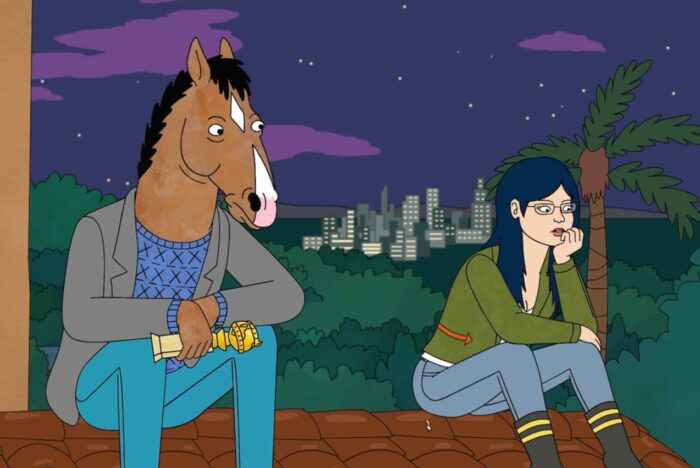
Speaking of Diane, the arc of BoJack Horseman is very much predicated on his relationship with her. The first episode revolves around them meeting to discuss her ghost writing his memoir. The final episode culminates with what could very well be the last time they see each other, as suggested through their dialogue. Both have grown and changed in no small part because of their influence on one another. Diane comes from a similar background of emotional neglect, and is initially positioned as being a source of wisdom and sanity. The other characters often remark on how much she seems to have her life together by comparison, but we soon understand she’s just as damaged in her own way.
We see her journey through marriage and divorce, through getting a dream job writing first-hand about Cordovian refugees (thus “making a difference”) and discovering she isn’t as well-suited to such hardship as she believed, through finally writing a book about herself before realizing that she’s unable to verbalize everything that she’s been through, and ultimately dovetailing into a successful but far less personal series of kid detective stories. She is proud and works hard to be socially conscious, yet finds herself constantly compromised either by society’s indifference or the temptation of her own comfort. Though she and BoJack have very comparable personalities, they prove increasingly toxic to one another. The show is admirable in that it doesn’t take the easy route of having them end up together (any romantic potential is addressed and summarily dismissed in the first season, never to be revisited), and acknowledges that even though they care for one another, their friendship is not exactly healthy for either of them.
Landing On Your Feet
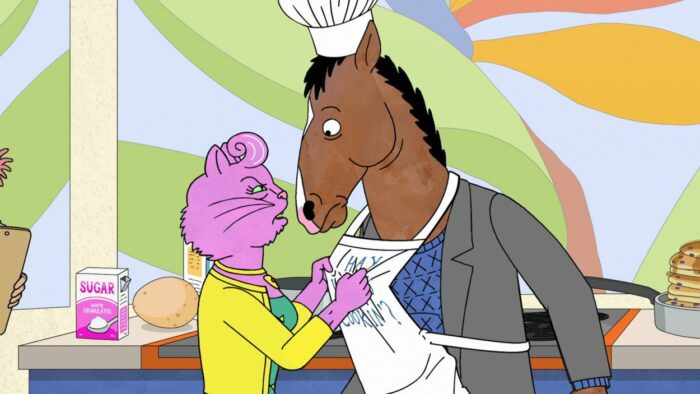
Another tumultuous relationship is the one BoJack has with his agent/manager/sometime-girlfriend Princess Carolyn, who initially prides herself on her ability to keep her work life and personal life separate, yet finds herself constantly sacrificing one for the other. Like BoJack, she’s looking for happiness in all the wrong ways, first in terms of career advancement, then in a romantic partner, then in adopting a baby, in the hopes that just having any one of these things will allow her to feel whole. Though constantly under pressure to put out fires for her various clients and keep projects together, she actually thrives on such chaos, and ultimately finds a connection with a fellow work-minded colleague.
Creating an ideal work-life balance is a long struggle, and she gradually realizes that although she will always love BoJack, she can’t allow his temperamental whims to dictate her life, and that she has to find her own source of empowerment. As with the rest of the supporting cast, the final episode grants the two of them a nice final exchange where they come to terms with what their relationship has been, and why they’re both going to be alright even if they’re not as omnipresent in one another’s lives anymore.
Things Just Working Out
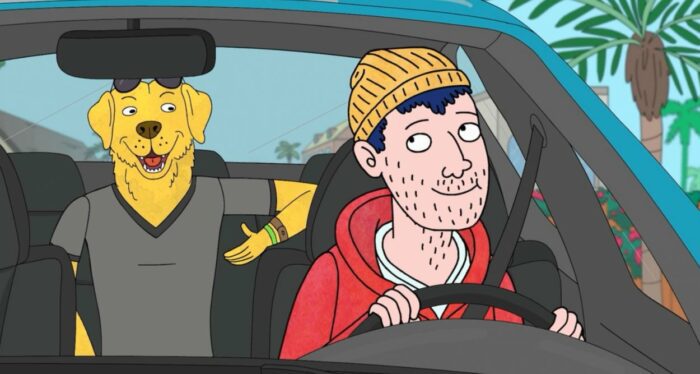
A similar understanding is reached with BoJack’s former houseguest, the perpetual slacker Todd Chavez. Often used for comic relief, though no less dimensional when it comes to his own lack of direction, Todd is a character whose arc isn’t so much perpetuated with random wacky misadventures as it is defined by them. Through sheer happenstance, he finds himself writing a rock opera, co-creating and later squandering a hugely successful rideshare app, landing a job as an ad executive before eventually being supplanted by his own sex robot (it’s a long story), and finally finding his true calling when he starts running a daycare center for Princess Carolyn’s daughter and her employees’ children.
Todd is very much a go-with-the-flow, carefree personality, but carries his own pain all the same. His romantic partnerships are complicated by his gradual understanding that he is asexual, his parents look down on his lifestyle choices, and his initial position as BoJack’s “best friend” leaves him especially vulnerable to the feelings of betrayal that come with the latter’s selfish behavior. There is a begrudging affection between the two, as well as a final understanding that they can’t expect too much from one another if they want to avoid being hurt.
Rounding out the main cast is the equally carefree Mr. Peanutbutter, a fellow sitcom star who has inadvertently achieved much of his success by copying what BoJack did before. Despite his testy and eventually failed marriage to Diane and BoJack’s occasional backstabbing, Mr. Peanutbutter can never stay mad at anyone for too long. His determination to always look on the bright side and show everyone how much he loves them is admirable, even if in the end he comes to understand that this might be masking his own sadness and need for attention. In the end, it is his ability to find happiness on his own rather than have it defined by his relationships that gives him a sense of completeness. This is true of all of the characters, and in a way indicative of celebrity culture as a whole: we must find peace and meaning within ourselves rather than demand or expect it of others, whether it’s the people in our lives or the famous people we look up to.
There Is No Other Side
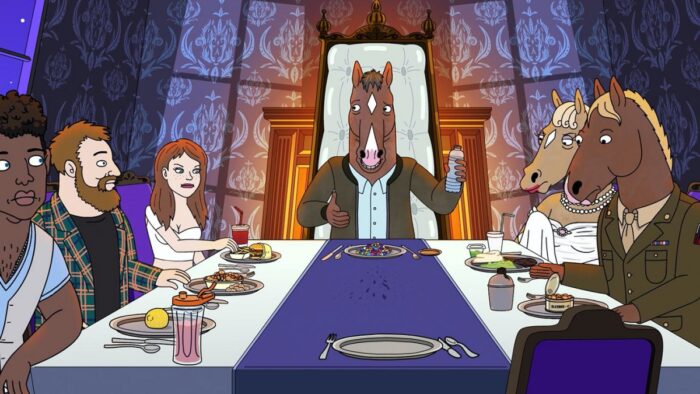
As BoJack Horseman approached its last episodes, the main question became; how would the title character end up? Would he find the peace and meaning he so dearly wanted? Would his addictions consume him the same way they consume so many? Would he finally face serious consequences for his many destructive life choices? Although I have thoroughly enjoyed the series as a whole and marveled at its consistent level of quality, I must admit that the final two episodes did seem like the creators tried to have their cake and eat it. The penultimate episode of every season is notorious for being the darkest and most emotionally devastating: the terrifying drug-fueled writing session, the prom night where BoJack nearly took advantage of Penny, the extended bender that resulted in Sarah Lynn’s overdose, the revelation of Beatrice’s traumatic childhood, the choking incident with BoJack’s costar.
The final season proved to be no exception, with an entire episode taking place in BoJack’s mind as he has dinner and watches a variety show with all the people he knows who have died around him, capping off with the realization that in real life he’s drowning in a pool and that this is all a kind of lucid fantasy before death consumes him. It’s shocking, brutal, honest about his failings yet uncaring in the wake of what appears to be his final moments of consciousness. It’s shatteringly emotional in the way that the show’s best episodes have always been, and concludes in a way that feels definitive.
This Is It
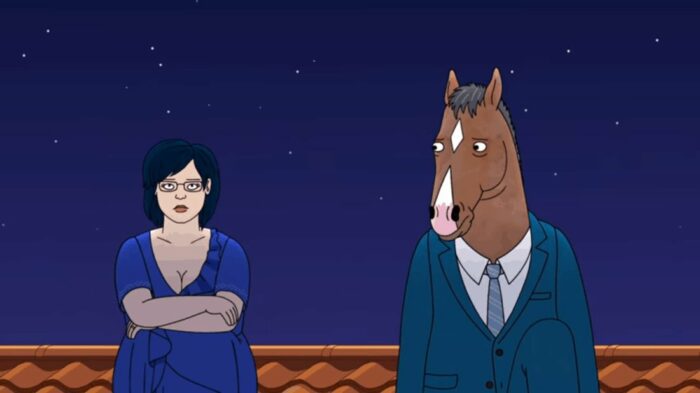
Yet in the actual final episode, we discover through a wacky montage that BoJack actually survived, but was sent to jail for breaking and entering (as well as everything else he’d gotten away with, in his mind at least). Despite this, he’s still able to get out for a day to attend Princess Carolyn’s wedding and get a touching final scene with each of his friends. While actually ending with the title character’s death would undoubtedly have been a hell of a downer for a show that never misses the chance to engage with copious animal-based puns, it would have also been very brave and largely on-brand, as the greatest strength of BoJack Horseman has always been its ability to balance the sillier, satirical elements with its surprisingly profound exploration of mental illness and the damage it can inflict. Instead, the show gets to have the heartbreak of his apparent death, without actually having to kill him off.
Despite this minor stumble in the final stretch, the overall achievement is never in doubt. This has been a show that fearlessly showcased toxic behavior and everything that goes into it and comes out of it, through the lens of a bizarre alternate reality that is at once hilarious and earnestly truthful. It doesn’t ultimately come down on one side or the other in terms of assessing BoJack as a character, because it knows that unlike the sitcom that made him famous, people’s lives and their problems can’t be neatly wrapped up in 30 minutes with a pithy one-liner or trite observations about the nature of society. People are messy, complicated, and ever-changing, and for the past six years, BoJack Horseman invited us into the world of some particularly messy people, inviting us to see them as they are, warts and all, and perhaps see something of ourselves in the process. I couldn’t be happier to have stuck with it, and I will always be grateful for the journey.

